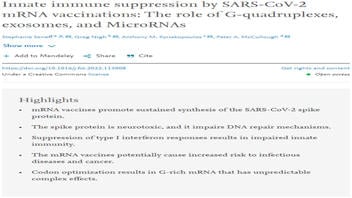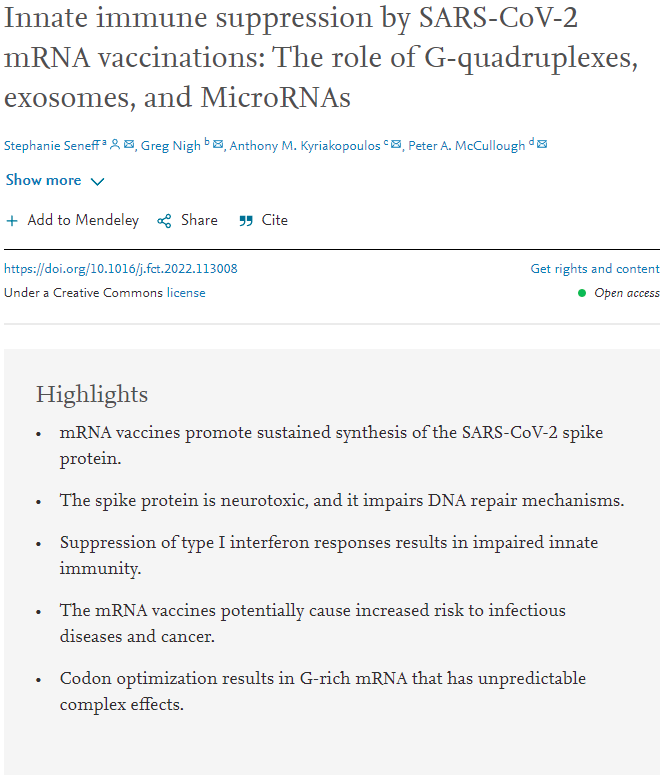
Do COVID-19 vaccines suppress innate immunity and increase the risk of infectious disease and cancer? No, that's not true: There's no evidence that COVID (SARS-CoV-2) mRNA vaccines are causing these maladies. The data used to make those claims are based on information from the Vaccine Adverse Event Reporting System (VAERS), a database that keeps a record of reported but often unconfirmed adverse effects. VAERS data does not prove a correlation between those reported events and vaccines.
The claims appear in an article (archived here) published to ScienceDirect on April 19, 2022, titled, "Innate immune suppression by SARS-CoV-2 mRNA vaccinations: The role of G-quadruplexes, exosomes, and MicroRNAs." It opened:
The mRNA SARS-CoV-2 vaccines were brought to market in response to the public health crises of Covid-19. The utilization of mRNA vaccines in the context of infectious disease has no precedent. The many alterations in the vaccine mRNA hide the mRNA from cellular defenses and promote a longer biological half-life and high production of spike protein. However, the immune response to the vaccine is very different from that to a SARS-CoV-2 infection.
This is what the article looked like on ScienceDirect on April 25, 2022:
(Source: ScienceDirect screenshot taken on Mon Apr 25 15:54:37 2022 UTC)
VAERS data
VAERS is managed by both the Food and Drug Administration and the Centers for Disease Control and Prevention (CDC). Anyone with internet access can add a report to the VAERS list of reports. The public access link to it expressly warns against unwarranted conclusions based on VAERS material because the list only provides a tally of unverified notes about any health event people experience after they are vaccinated.
The list itself cannot be used to prove or quantify, since all it shows is a chronological correlation, not the causal link that would be more difficult to establish. It's the equivalent of a police precinct's running "blotter" of initial reports that may serve as a starting point for police work, not an endpoint.
VAERS website warnings include:
When evaluating data from VAERS, it is important to note that for any reported event, no cause-and-effect relationship has been established. Reports of all possible associations between vaccines and adverse events (possible side effects) are filed in VAERS. Therefore, VAERS collects data on any adverse event following vaccination, be it coincidental or truly caused by a vaccine. The report of an adverse event to VAERS is not documentation that a vaccine caused the event.
Lead Stories has debunked several claims about vaccine deaths that misuse VAERS.
Spike protein
The Centers for Disease Control and Prevention website says it's not true that mRNA vaccines promote the sustained synthesis of the SARS-CoV-2 spike protein.:
mRNA vaccines tell our cells to make a piece of the 'spike protein' that is found on the surface of the SARS-CoV-2 virus. Since only part of the protein is made, it does not harm the vaccine recipient, but it is antigenic and thus stimulates the immune system to make antibodies.
After the piece of the spike protein is made, the cell breaks down the mRNA strand and disposes of it using enzymes in the cell. ... the mRNA strand never enters the cell's nucleus or affects the vaccine recipient's genetic material. Knowing this helps you respond to misinformation about how mRNA vaccines alter or modify someone's genetic makeup.
Once displayed on the cell surface, the protein or antigen causes the immune system to begin producing antibodies. These antibodies are specific to the SARS-CoV-2 virus spike protein, which means the immune system is ready to protect against future infection.
Infectious disease and innate immunity
The VAERS data provide no proof of an increase in the risk of infectious diseases or suppression of innate immunity. In a March 23, 2022, email to Lead Stories, the Public Health Agency of Canada (PHAC) said:
There is ... no evidence that COVID-19 vaccines impair the immune system or increase the susceptibility of COVID-19-vaccinated individuals to other (non-SARS-CoV-2) viruses or any other pathogen. Many studies carried out by a myriad of independent research groups have consistently demonstrated that the COVID-19 vaccines induce a robust immune response in vaccinated individuals and the fact that they are so protective against hospitalization and death from COVID-19 attests to the fact that the immune response is not impaired by these vaccines.
This is how MedlinePlus describes innate immunity:
Innate, or nonspecific, immunity is the defense system with which you were born. It protects you against all antigens. Innate immunity involves barriers that keep harmful materials from entering your body. These barriers form the first line of defense in the immune response.
Lead Stories has debunked multiple claims of COVID vaccines damaging human immune systems (here, here, here, here and here).
Cancer
UCI Health, the teaching hospital for the University of California, Irvine School of Medicine, says you can't get cancer from a COVID shot:
Do the COVID vaccines cause cancer?
The COVID vaccines do not cause cancer. In fact, scientific advancements have allowed these types of vaccines (mRNA vaccines and adenovirus vector vaccines) to treat cancer. The way these vaccines work is to provide an instruction set to make a protein. When used to treat cancer, these vaccines work to create proteins similar to those on the surface of cancer cells so that the body learns to recognize them as non-human and fights against them. In the same way, the COVID vaccines make the COVID-19 spike protein and help the body make antibodies and fight against the virus. The vaccine is not alive and cannot infect or change our cells.
The authors
One of the doctors who wrote the ScienceDirect article, Peter A. McCullough, M.D., is not a vaccinologist nor an immunologist. Baylor University Medical Center, where he was a cardiologist, fired him when he became a major spreader of COVID misinformation and filed a million-dollar suit against him for using the university's name when making claims like this about COVID vaccines.
Although experts in the same field sometimes disagree, medical science discourages people from asserting expertise outside their field. McCullough is not trained in vaccine development or immunology. His online resume lists his specialty as coronary artery disease and his board certification as cardiology. Searching his publishing history on ORCID (a system that tracks each researcher's output), Lead Stories found more than two dozen pieces of published research mostly on cardiology, but none on the topic of spike proteins, nor the mechanisms by which mRNA vaccines work. Lead Stories found no McCullough-authored studies on vaccinology or immunology in the catalog of the National Library of Medicine, which provides the world's largest index of medical science journals.
The second author is Stephanie Seneff. She's a senior research scientist at the MIT Computer Science and Artificial Intelligence Laboratory. She has no medical degree. Lead Stories previously debunked a claim where she provided no proof COVID-19 vaccines have possible long-term side effects. Lead Stories debunked another claim by Seneff involving celiac disease and gluten intolerance.
The third author is Greg Nigh. The bio on his website says he's completed both the Naturopathic Doctor (ND) and the Master of Science in Oriental Medicine (MSOM) programs at the National University of Natural Medicine.
The fourth and final author is Anthony Kyriakopoulos. He's the head of research and development at Nasco A.D. Biotechnology Laboratory. His LinkedIn bio says he has a doctorate of philosophy in clinical and molecular microbiology from the University of Athens School of Medicine.
Vaccine safety
The Journal of the American Medical Association in September 2021 published a study of the health records of 6.2 million mRNA vaccine recipients, finding event rates for 23 serious health outcomes were not significantly higher in vaccinated persons up to three weeks after vaccination.
The CDC's assurance of COVID vaccine safety, which rests on that and similar peer-reviewed research, is as follows:
- COVID-19 vaccines were developed using science that has been around for decades.
- COVID-19 vaccines are safe -- much safer than getting COVID-19.
- COVID-19 vaccines are effective at preventing severe illness from COVID-19 and limiting the spread of the virus that causes it.
- Millions of people in the United States have received COVID-19 vaccines under the most intense safety monitoring in U.S. history. CDC recommends you get a COVID-19 vaccine as soon as you can.


















